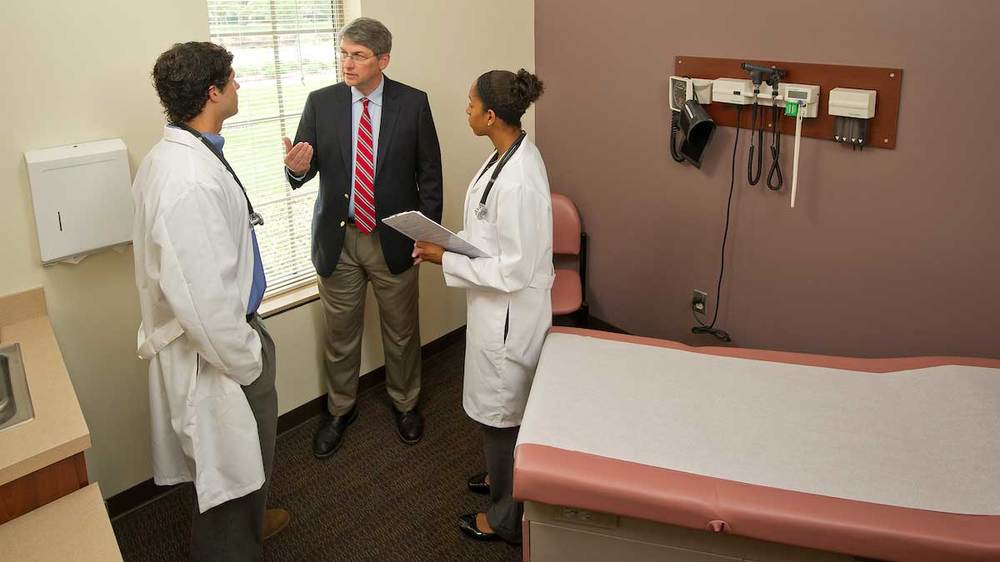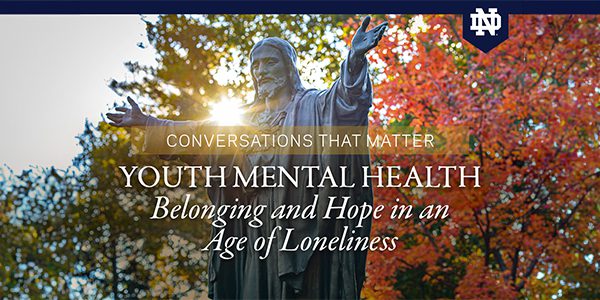On the front lines of the coronavirus fight, health professionals show ‘compassion to its fullest’
The images flood news broadcasts and social media feeds. Doctors, nurses, clinicians and emergency medical technicians working tirelessly to treat patients suffering from the novel coronavirus.
They start and end their days separated from their families. Their posts on social media are both inspiring and heartbreaking. They plead with Americans to stay at home in an effort to curb the spread, and plead with officials to provide the necessary equipment to do their jobs —and some even losing their jobs for speaking out about the conditions they face.
As officials warn of increasingly tough times to come, the question looms: What will the mental and emotional toll be on U.S. health care workers?

Dominic Vachon, the John G. Sheedy, M.D., Director of the Ruth M. Hillebrand Center for Compassionate Care in Medicine at the University of Notre Dame, and author of How Doctors Care: The Science of Compassionate and Balanced Caring in Medicine, is an expert in compassion science. He teaches students preparing for medical school in the scientific theory and practice of compassionate care in medicine and effective communications skills for physicians, nurses and allied health professionals at every level of training and practice.
In the midst of an unprecedented crisis, Vachon offers insight into the complexities of the compassion mindset — which he says is currently on full display inside America’s hospitals and health care facilities.
What do you think about when you look at what’s happening inside health care facilities right now?
What we are seeing in health professionals right now is compassion to its fullest, which is noticing suffering, being moved by it, wanting to do something about it and trying to do whatever they can to alleviate that suffering. We are seeing the preciousness of the intrinsic motivation for compassion of these individuals.
There is nothing health professionals want more than to be able to use their knowledge and training to help others. They are trained to manage their emotions to respond to the suffering of others. And what’s going on is, we’re seeing the dynamics and complexities of compassion being shown in ways we may not have considered outside of the crisis.
Can you give an example?
Health care professionals know in order to do their work, they have to protect themselves because if they’re afraid for themselves, they will have difficulty being compassionate — and a critical, first step is personal protective equipment (PPE). If you really want to be compassionate in the long run, you need to make sure you’re protected, so that you can do as much as possible and not infect others or loved ones. A lot of people don’t think about that as compassion but that’s very much a part of the compassion mindset.
What is the compassion mindset?
People who operate in a compassionate way, have a way of emotionally regulating themselves so that they can focus their trained competence on whatever is in front of them. So, in the brain, in any human being, when compassion is the dominant motivation, it basically generates a certain pattern of brain function that is directed toward alleviating suffering while at the same time maintaining emotional composure in the clinician.
We train people in an understanding of compassion beyond sentimental compassion, which is more of a sympathetic identification, feelings of pity or ‘this is awful’ and that kind of thing.
Compassion isn’t defined by just being nice. It means you have the emotional composure to apply your skills to do what’s necessary. All the dynamics and facets of self-protection, passion, focused concentration and emotional composure is compassion in its reality and its toughness.
Now, health professionals are highly trained for this. It’s a highly-trained response to prioritize their physical protection, with PPE, and then emotionally regulate themselves so they can put the patient’s suffering above all else.
The brain has this compassionate machinery going on — and we are seeing it not just in health professionals, by the way. This is a human response, where we’re seeing people do these amazing things. There are people sewing masks, people putting little bears in windows, people playing music online, and reaching out to support others through computer technology in all sorts of ways.
What we’re seeing is compassion in its awesomeness in front of us.
Medical professionals have struggled with burnout even before an unprecedented crisis. This has to take a toll on them at some point, right?
I’ll give you the straight answer. The sheer volume of this does take a toll. On the other hand, it’s important to remember that health professionals do this every day. Before the crisis, doctors and nurses in intensive care units, emergency rooms and hospice care nurses deal with this kind of suffering day in and day out.
It’s not the suffering that burns them out. It’s being blocked from responding to that suffering that burns them out or not having what they need to respond to suffering.
This crisis has exposed our inverted priorities. On the one hand, we have these individuals whose intrinsic motivations we count on and take for granted — but we’ve also run healthcare business to the edge to maximize profitability while treating our compassionate clinicians as a replaceable commodity. We only have as many nurses as we need, and as many beds as we need and as many ventilators as we need — and now we need more. We weren’t ready for this. We forgot. We forgot how important all of this is.
What’s really frustrating for them is not having enough ventilators, not having enough PPE and not having a system that responds to this.
So, what will happen, and it’s happening now, is you will hear doctors and nurses speak up and ask, what’s wrong with us that we don’t have what we need? Why did we drop the ball two months ago? What can we do right now? They’re activated and they’re fired up, and that anger is in a very productive, compassionate direction. They’re showing us all why we need good public health, why we need to take care of our nurses and doctors and what happens when all of a sudden there’s not enough of them to do this work. All the technology in the world can’t replace these humans who are able to do this work.
What impact will this crisis have on health care moving forward?
I think we’ll be faced with a new invitation to evaluate ourselves in a societal way. We have tended to devalue the truly caring motivation in our helping professionals because we think it’s not worth very much. And yet the preciousness of compassion fuels these medical professionals to keep going. While there is a deep sadness with the suffering of so many people, people who are rooted in a compassion mindset are intensely responding to that sadness by asking themselves what can they do to try to alleviate that suffering. This is what’s worth fighting for. It’s worth fighting to make the world a better place.
At any moment we could collapse in utter despair about the sheer suffering in the world. The only reason we don’t is a compassion mindset. With that, we hang on.
Originally published by Jessica Sieff at news.nd.edu on April 7, 2020.
Contact: Jessica Sieff, assistant director of media relations, 574-631-3933, jsieff@nd.edu
April 22, 2020



